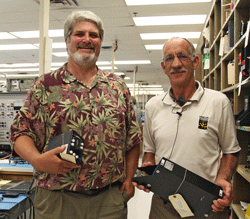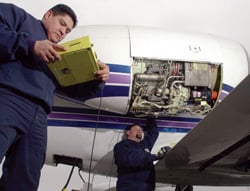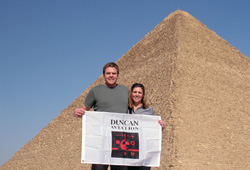
Duncan Aviation's Avionics Tech Reps, Curt Campbell and Larry Troyer help operators troubleshoot squawks and coordinate autopilot repairs.
The autopilot is a vital component on an aircraft. When it isn’t functioning properly, there can be all kinds of problems. There aren’t many places where operators can find the autopilot knowledge, experience and technical expertise all in one place.
What if operators could create their own autopilot team? They would be able to troubleshoot the system in the aircraft more efficiently, ensure the right box or boxes are removed for repair, access autopilot loaners while equipment is in for repair and schedule appropriate turn times.
Here are three criteria to look for when selecting an autopilot support center.
1. Autopilot Technical Experts
Sometimes an experienced technical representative can ask questions to walk an operator through a series of troubleshooting steps over the phone. However, being able to troubleshoot an autopilot squawk over the phone requires an intimate knowledge of the system and how it works on all airframe models. Qualified autopilot tech reps are able to troubleshoot and isolate autopilot problems on aircraft over the phone and by utilizing test flights for the more intermittent glitches.
2. Autopilot Customer Account Support
Customer service is very important when an autopilot needs to be repaired. Account reps should be intimately familiar with scheduling and turn times associated with different types of autopilot equipment. They should also maintain good communication with avionics teams, and be knowledgeable about which technicians are most experienced with the autopilot specific to an operator’s aircraft. If the need arises, they should also be able to connect an operator directly to the avionics tech to clarify squawk information or quote options.
3. Skilled Autopilot Leaders
Managing a team of autopilot technicians, coordinating test equipment and ensuring downtimes are met has its challenges. Verifying a squawk for a simple function check can exceed eight hours on some a/p computers. A skilled autopilot team leader can use their resources effectively to repair and return an autopilot on time and on budget.
Duncan Aviation’s Component Solutions team includes autopilot technical experts with the expertise and capabilities to work on many aircraft models, including Learjet, Citation, Falcon, Challenger, Hawker, Westwind/Astra, King Air, Piper Cheyenne and Rockwell Commander. Search our aircraft parts and capabilities list to verify our expertise on your autopilot. For more information please call Duncan Aviation's Avionics Customer Account Reps or Technical Representatives.
Kevin Miesbach is the Avionics and Instruments Shop Manager for Duncan Aviation’s Component Solutions team located in Lincoln, Neb. His aviation career began in 1985.




